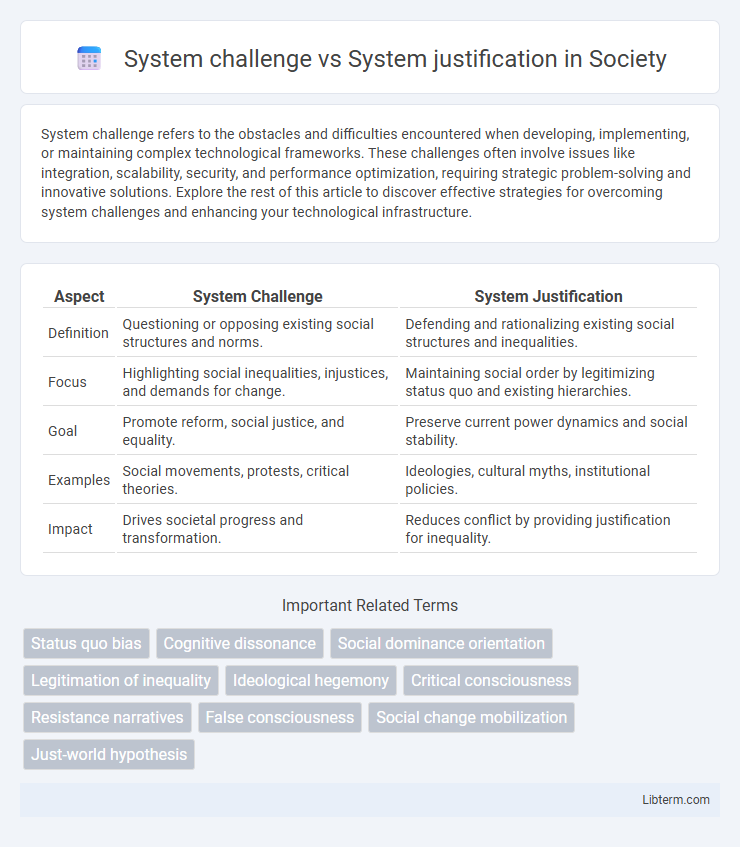System challenge refers to the obstacles and difficulties encountered when developing, implementing, or maintaining complex technological frameworks. These challenges often involve issues like integration, scalability, security, and performance optimization, requiring strategic problem-solving and innovative solutions. Explore the rest of this article to discover effective strategies for overcoming system challenges and enhancing your technological infrastructure.
Table of Comparison
| Aspect | System Challenge | System Justification |
|---|---|---|
| Definition | Questioning or opposing existing social structures and norms. | Defending and rationalizing existing social structures and inequalities. |
| Focus | Highlighting social inequalities, injustices, and demands for change. | Maintaining social order by legitimizing status quo and existing hierarchies. |
| Goal | Promote reform, social justice, and equality. | Preserve current power dynamics and social stability. |
| Examples | Social movements, protests, critical theories. | Ideologies, cultural myths, institutional policies. |
| Impact | Drives societal progress and transformation. | Reduces conflict by providing justification for inequality. |
Understanding System Challenge and System Justification
Understanding system challenge involves recognizing actions and attitudes aimed at questioning or opposing existing social, political, or economic structures perceived as unfair or oppressive. System justification refers to the psychological motivation to defend and rationalize the status quo, even when it may disadvantage certain groups, by perceiving the system as legitimate and stable. These contrasting processes influence individual and collective responses to societal issues, shaping dynamics of change and resistance.
Historical Roots of System Justification Theory
System Justification Theory originated in the late 1990s through the foundational work of social psychologists John Jost and Mahzarin Banaji, who explored why individuals often endorse existing social, economic, and political arrangements even at the expense of their own group interests. This theoretical framework builds on earlier research in cognitive dissonance, social identity, and motivated reasoning, emphasizing the psychological need to perceive social systems as fair, legitimate, and stable. Historical roots trace back to classical theories of ideology and hegemony, positioning system justification as a mechanism underpinning resistance to social change and the maintenance of status quo inequalities.
Psychological Mechanisms Behind System Justification
System justification theory explains psychological mechanisms that lead individuals to defend and rationalize existing social, economic, and political systems, even at the expense of personal or group interests. Cognitive dissonance reduction plays a key role as people align beliefs with the status quo to maintain a sense of stability and predictability. Motivated reasoning and existential anxiety also drive system justification by reducing uncertainty and reinforcing perceptions of fairness and legitimacy in hierarchical structures.
Motivations Driving System Challenge
Motivations driving system challenge often stem from perceived injustices, social inequalities, and unmet needs within existing structures, prompting individuals or groups to seek transformative change. Psychological factors such as moral outrage, collective identity, and aspirations for fairness intensify the desire to question and oppose entrenched systems. Social dynamics including awareness of alternative systems, empowerment through collective action, and the pursuit of equity fuel sustained efforts to challenge and disrupt prevailing societal frameworks.
Social and Political Contexts Influencing Both Processes
System challenge involves questioning and resisting existing social and political structures that perpetuate inequality, often driven by marginalized groups seeking equity and reform. In contrast, system justification reflects the psychological motivation to defend and rationalize the status quo, frequently influenced by dominant groups benefiting from current power dynamics. Both processes are deeply shaped by cultural narratives, institutional practices, and historical power relations that sustain social hierarchies.
Consequences of System Justification on Society
System justification perpetuates social inequalities by reinforcing existing power structures and legitimizing unjust practices, which hinders social change and innovation. This psychological defense mechanism fosters acceptance of status quo disparities, leading to diminished motivation for collective action against oppression. As a result, marginalized groups may internalize their disadvantaged positions, exacerbating social stratification and reducing overall societal progress.
System Challenge: Drivers of Social Change
System challenge drives social change by motivating individuals and groups to question and oppose existing power structures, norms, and policies. Key drivers include social movements, activism, technological innovation, and shifting cultural values that expose inequalities and demand reforms. These forces create pressure on institutions, leading to progressive transformations and expanded rights within societies.
Resistance to Change: Barriers Created by System Justification
System justification creates psychological barriers that increase resistance to change by motivating individuals to defend and rationalize existing social, political, or organizational structures. This resistance stems from a desire to maintain perceived stability and legitimacy, even when those systems perpetuate inequality or inefficiency. Consequently, system challenge efforts often encounter significant pushback due to deep-rooted cognitive biases favoring the status quo.
Balancing Reform and Stability: Navigating the Tension
System challenge demands reform to address inequalities and inefficiencies, driving social progress and innovation. System justification promotes stability by legitimizing existing structures, reducing uncertainty and preserving social cohesion. Balancing these forces requires strategic dialogue that integrates necessary change while maintaining foundational order, enabling sustainable development.
Implications for Policy and Social Movements
System challenge drives social movements to demand structural reforms, focusing on dismantling inequalities and promoting justice, which influences policymakers to adopt transformative policies that address root causes. System justification often leads to resistance against change by reinforcing dominant narratives and maintaining status quo, resulting in policy inertia or incremental adjustments rather than comprehensive reforms. Understanding the tension between system challenge and justification is crucial for designing effective advocacy strategies that mobilize public support and create sustainable social change.
System challenge Infographic

 libterm.com
libterm.com